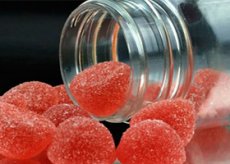New publications
Chewable vitamins can be harmful
Last reviewed: 02.07.2025

All iLive content is medically reviewed or fact checked to ensure as much factual accuracy as possible.
We have strict sourcing guidelines and only link to reputable media sites, academic research institutions and, whenever possible, medically peer reviewed studies. Note that the numbers in parentheses ([1], [2], etc.) are clickable links to these studies.
If you feel that any of our content is inaccurate, out-of-date, or otherwise questionable, please select it and press Ctrl + Enter.

What could be harmful in vitamins? After all, these are vital substances for the body that should only bring benefits. But, as experts say, everything depends on the form of the vitamin preparation. Thus, vitamins in chewable form often do not have the expected therapeutic and preventive effect. As the experiment showed, the components of such vitamins are more harmful than beneficial to health.
Chewable vitamins were developed primarily for children: such preparations are sweetish, they resemble candies, and therefore are easily perceived by children of any age. However, experts are sure that these "sweets" are not able to provide the child's body with the necessary useful vitamin substances. The only "plus" of such chewable vitamins is that children eat them with pleasure, since such preparations are sweet and pleasant to taste. Experimentally, scientists have proven that in most cases the composition of chewable vitamins, declared on the packaging, does not correspond to reality. The amount of vitamins and minerals in such preparations is not maintained and differs from that indicated in the instructions.
Experts representing ConsumerLab conducted a series of tests, comparing five dozen different chewable multivitamin preparations. It was found that 80% of these preparations did not clearly correspond to the generally accepted standards for vitamin food supplements.
Not only children, but also many adults often take chewable forms of vitamins, refusing regular vitamin pills or tablets. It's all about the convenience of use and the pleasant taste of such products. But scientists insist: additional substances and sweeteners, which are present in large quantities in chewable vitamins, can cause more harm than good.
According to the U.S. Food and Drug Administration, at least thirteen different vitamins are necessary for a healthy human body. These substances can be obtained from foods, pharmaceuticals, or dietary supplements.
Chewable vitamins do contain a number of essential nutrients, but their quantity is minimal compared to the large list of not entirely healthy components that serve as additives to improve the quality and taste of the vitamin product.
The study found that twelve of the five dozen commonly available chewable vitamins contained 24% fewer vitamin components than the labels indicated. Other ingredients were found to contain 157% more than the labels indicated. In addition, the vast majority of chewable vitamins were not approved by the relevant regulatory agencies. This means that such products have not undergone laboratory and clinical testing, as is usually the case with other drugs.
Information provided on the Med2 website.

 [
[